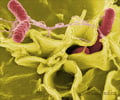Food poisoning and food borne diseases are very common in all parts of the world. Here we take a look at the major food borne diseases of 2012 that has been a challenge to the health of an individual.

• Salmonella Enteritidis that was found in ground beef.
• Salmonella Bredeney that was mostly seen in peanut butter.
• Listeria monocytogenes mainly present in ricotta salata cheese.
• E coli O26 seen in raw clover sprouts.
• Salmonella Braenderup present in mangoes.
Salmonella Bareilly or Salmonella Nchanga: Most people who suffered from this pathogen had consumed sushi made out of raw tuna. The salmonella bacteria are more commonly found in raw foods. If the same is not cooked properly under right temperature then this organism easily affects one. Always cook the food properly before consuming in order to prevent Salmonella infection.
Salmonella Bredeney: Peanut butter is widely used by every group of people in every society, especially the school going children. It is important to check the manufacture date and the expiry date needs before buying this product as this is a growth zone for the Salmonella Bredeney type of organism in the food. It is the third most common serotype that is found to affect the human population. As with other Salmonella infections, children under the age of 10 years, older adults, and people with weak immune systems are at a higher risk for this infection.
Listeria monocytogenes: Listeria monocytogenes is the bacterium that causes the infection listeriosis. It is a facultative anaerobic bacterium, which means it is capable of surviving in the presence of oxygen but can also survive when oxygen is insufficient for respiration. It can grow and reproduce inside the host's cells and is one of the most virulent food-borne pathogens, with 20 to 30 percent of clinical infections resulting in death. It is most commonly found in ricotta salata cheese. Pregnant mothers are advised not to consume this cheese as this pathogen has the ability to cause meningitis in newborn.
E coli O26: The Escherichia coli O26 is the pathogen most commonly found in raw clover sprouts that is used to make sandwiches. When not cleaned properly this sprout has the ability to infect human beings causing various symptoms that need medical attention. These symptoms are often self-limiting.
Salmonella Braenderup: This serotype of Salmonella outbreak was associated with infected mangoes from Agricola Daniella, a mango supplier with multiple farms and a single packing house located in Sinaloa, Mexico. The trees producing mangoes were infected thereby producing infected mangoes that affected the intestine. No deaths occurred because of this infection.
Human Salmonella Infantis: Pet dogs are commonly fed with the commercially produced dog foods available from the market. These foods could be affected with Salmonella and when proper hand hygiene is not maintained after touching these foods, it in turn affects the humans, especially children, who are less cautious about washing hands. Washing hands thoroughly after contact with dog food prevents infection.
By following all the precautions one can prevent contacting these diseases in 2013. Let this year be a disease free year.
Source-Medindia













